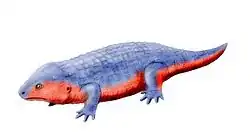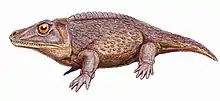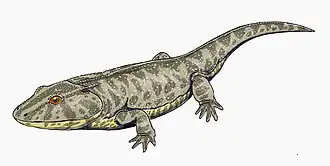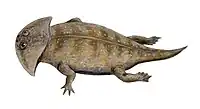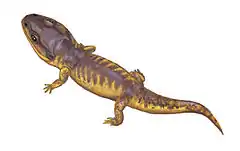Brachyopidae
Brachyopidae is an extinct family of temnospondyl labyrinthodonts.[1] They evolved in the early Mesozoic and were mostly aquatic. A fragmentary find from Lesotho, Africa is estimated to have been 7 metres (23 ft) long, the largest amphibian ever known to have lived besides Prionosuchus and Mastodontosaurus.[2] Brachyopids were the only group of temnospondyls to survive into the Jurassic aside from their sister family Chigutisauridae. With records of the family from the Jurassic of Asia.
| Brachyopidae Temporal range: | |
|---|---|
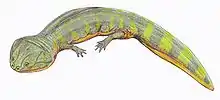 | |
| Batrachosuchus | |
| Scientific classification | |
| Domain: | Eukaryota |
| Kingdom: | Animalia |
| Phylum: | Chordata |
| Class: | Amphibia |
| Order: | †Temnospondyli |
| Suborder: | †Stereospondyli |
| Superfamily: | †Brachyopoidea |
| Family: | †Brachyopidae Lydekker, 1885 |
List of genera
- Banksiops
- Bathignathus
- Batrachosaurus
- Batrachosuchoides
- Batrachosuchus
- Brachyops
- Gobiops
- Notobrachyops
- Platycepsion
- Sinobrachyops
- Vanastega
- Xenobrachyops
References
- Warren, A. A., & Marsicano, C. (1998) Revision of the Brachyopidae (Temnospondyli) from the Triassic of the Sydney, Carnarvon and Tasmania Basin, Australia: Alcheringa v. 22, p. 329-342.
- Steyer, J.S. & Damiani, R. (2005): A giant brachyopoid temnospondyl from the Upper Triassic or Lower Jurassic of Lesotho. Bulletin de la Société Géologique de France, no. 3: pp 243-248. doi:10.2113/176.3.243 abstract
This article is issued from Wikipedia. The text is licensed under Creative Commons - Attribution - Sharealike. Additional terms may apply for the media files.



